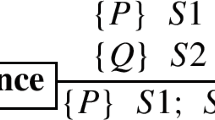Abstract
In his landmark 1977 paper “The Temporal Logic of Programs”, Amir Pnueli gave a fundamental recognition that the ideally nonterminating behavior of ongoing concurrent programs, such as operating systems and protocols, was a vital aspect of program reasoning. As classical approaches to program correctness were based on initial-state/final-state semantics for terminating programs, these approaches were inapplicable to programs where infinite behavior was the norm. To address this shortcoming, Pnueli suggested the use of temporal logic, a formalism for reasoning about change over time originally studied by philosophers, to meaningfully describe and reason about the infinite behavior of programs. This suggestion turned out to be remarkably fruitful. It struck a resonant chord within the formal verification community, and it has had an enormous impact on the development of the area. It matured into an extremely effective mathematical tool for specifying and verifying a vast class of synchronization and coordination problems common in concurrency. Pnueli thus caused a sea-change in the field of program verification, founding the time of reasoning about time, which has been the most successful period in formal methods yet.
Access this chapter
Tax calculation will be finalised at checkout
Purchases are for personal use only
Similar content being viewed by others
Author information
Authors and Affiliations
Editor information
Editors and Affiliations
Rights and permissions
Copyright information
© 2010 Springer-Verlag Berlin Heidelberg
About this paper
Cite this paper
Allen Emerson, E. (2010). Time of Time. In: Cousot, R., Martel, M. (eds) Static Analysis. SAS 2010. Lecture Notes in Computer Science, vol 6337. Springer, Berlin, Heidelberg. https://doi.org/10.1007/978-3-642-15769-1_1
Download citation
DOI: https://doi.org/10.1007/978-3-642-15769-1_1
Publisher Name: Springer, Berlin, Heidelberg
Print ISBN: 978-3-642-15768-4
Online ISBN: 978-3-642-15769-1
eBook Packages: Computer ScienceComputer Science (R0)




